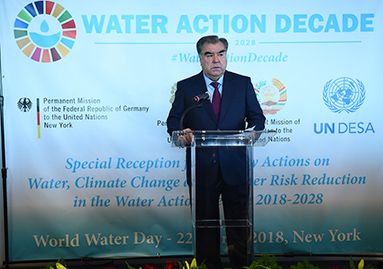Mr. Vice-President of the General Assembly,
Mr. Under-Secretary General,
Ladies and gentlemen,

Today we have successfully conducted our first dialogue devoted to the launch of the International Decade of Action “Water for Sustainable Development 2018 – 2028”.
Deliberations and productive exchange of views among stakeholders prove the need we should enhance and reinforce our efforts to achieve water related goals and targets.
Meanwhile, we pledged to recognize probable negative repercussions of climate change and cope with natural disasters happening often than ever before.
Observations and studies of our experts over the years indicate an unprecedented growing impact of climate change on nature and socio-economic situation of Tajikistan and Central Asia.
According to studies and estimations, annual average temperature of air in Tajikistan over the last 60 years raised by 1 degree C, number of days with heavy precipitation and, consequences and tense of natural hydro-meteorological phenomena are highly increased.
Destroying natural disasters become unprecedentedly often over the last years in Tajikistan.
Such natural disasters as inundation, mudflow, avalanche and landslide cause huge damage to the people and the national economy of the country every year.
Natural disasters rate in Tajikistan is increased approximately by 25% over the recent 5 – 6 years.
Over this period of time different ruinous natural disasters claimed nearly 200 human lives.
Disasters disrupted living conditions of more than 100 thousand people and caused 600 million US dollars of damage in aggregate.
Calamities observed particularly in the mountainous areas of the country which cover 93% of the whole territory of Tajikistan and where 80% of population live.
Moreover, negative impact of a climate change mostly hits quantity and quality of safe drinking water.
Over the last decade, Tajikistan experienced rapid unprecedented ice melting, which is a vital source of life for all people and countries in Central Asia.
Notable shifts in hydrological cycle while posing negative effect on water, energy and food security, provoke and entail added risk and danger of flood and heavy drought.
Central Asia is the region where the water source mainly originates from within the territories of certain countries, but a major part of reserves is used mostly by others.
There is a need in Central Asia to elaborate and enact Integrated Regional Strategy for Adaptation to Climate Change.
Intensive ice melting and loss of glaciers in the region which are provoked by and inseparably linked with a climate change effects, acknowledge the necessity and magnificence of such Strategy.
Tajikistan places particular emphasis on measures aimed at advancing adaptation to climate change which is essential in sustainable development.
To conclude, I extend my deep appreciation to all participants of this reception and wish all of you every bit of luck to commitments you endeavor to do.
Thank you!
